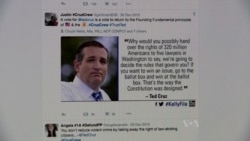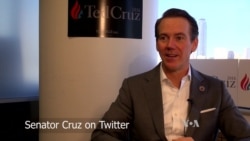Ted Cruz loves Twitter. At Cruz 2016 presidential campaign headquarters in Houston, Texas, members of his team talk about the senator's attachment to his smartphone and the campaign's emphasis on social media.
"He is probably the one person I know who will sit and scroll through and read tweets more than I do, and it's my job," said Josh Perry, the social media director for the campaign.
Cruz is one of many in the 2016 presidential campaign taking advantage of the unique ways social media can break down traditional boundaries among candidates and voters.
Voters are increasingly turning to their smartphones to read political news and follow political figures, according to a 2014 Pew Research survey. Those numbers are highest among young voters, who value making personal connections with politicians.
"Without social media, you're ignoring millennial voters," said Chris Wilson, director of research and analytics for the Cruz campaign. "Sen. Cruz is someone who is very active on social media, he's someone who is just as likely to be playing Candy Crush on his phone as reading the National Journal."
Perry, the 27-year-old who runs the day-to-day operations of Cruz's Twitter feed, agrees.
"If you tweet at Senator Cruz, there's a decent chance he'll read your tweet on his phone," he said.
Perry said he is surprised by the level of voter excitement in this election cycle.
"For the longest time, you knew they existed and they advertised to you and that was it, there was no kind of way for you - unless you were in the campaign headquarters - to play a role in supporting the candidate."
Senator Cruz even uses CruzCrew, a smartphone app the campaign developed to allow supporters anywhere in the country to volunteer for the campaign. Users compete to earn points for campaign activities ranging from liking the senator on Facebook to Tweeting about him and sharing photos.
App users are also invited to share their contacts, allowing the campaign to match up those shares with voter files. The process, said Wilson, has allowed the campaign to "identify over a million voters in the early states."
Personal becomes public
Presidential candidates know the battle for social media followers can ultimately translate into fundraising.
"With an app, you're open all the time, you can reach people all the time and you can locate them," said Michael Cornfield, a professor at The George Washington University.
Cornfield runs the PEORIA Project, a study of how candidates in the 2016 election are getting their message out through mainstream and social media. He found the Cruz campaign leads Republican candidates in translating social media follows and conversations into visits to his website.
On Twitter and Instagram, Donald Trump and Hillary Clinton share similar numbers of followers in the millions while on Facebook, Ben Carson comes out ahead.
"Ben Carson is a master at Facebook," said Cornfield. "He goes on to Facebook every night and he exchanges messages with his supporters. Others, like Hillary Clinton and Bernie Sanders, are using email. So the Internet has a multiplicity of channels."
Cornfield notes that Sanders has achieved success by inheriting and then expanding upon a digital political network that progressives have been using for at least 10 years.
WATCH: VOA talks to the Cruz campaign about Tweeting
Tweeting a movement
The 74-year-old Vermont senator may seem an unlikely figure to inspire a passionate social media following with popular hashtags like #FeeltheBern. But Ben Spielberg, a 27-year-old Washington, DC-based supporter of Sanders, said the grassroots-inspired campaign's focus on issues usually left out of the political mainstream is a perfect fit for open discussion on the Internet.
"Unlike traditional media sources, really anybody can have a voice and they can tweet something compelling or if there is a hashtag that's trending, they can be heard," said Spielberg.
Spielberg blogs daily about politics and tweets to help build support for Sanders. Spielberg said he makes an effort to engage with opposing viewpoints on Twitter, building a discussion for a broader movement on social change.
"There's tons of activity around his tweets, that stuff does permeate the mainstream media and then, I think, makes it into the national consciousness," he said.
Spielberg said he thinks that discussion will continue online even after the campaign ends. "People will still be tweeting about and holding whatever politician is elected accountable."
The lasting impact of social media in the 2016 campaign may come after Election Day from the newly engaged group of voters who feel personally invested in the politicians representing them.






